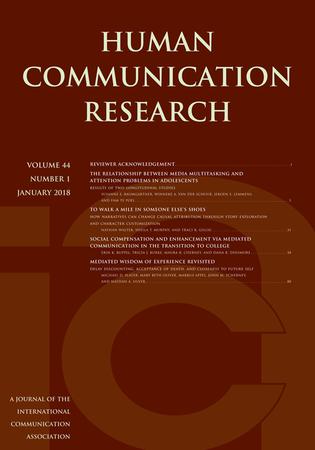不文明分歧的表达效应:认知失调与自我感知的机制
IF 3.3
1区 文学
Q1 COMMUNICATION
引用次数: 0
摘要
政治不文明现象普遍存在,而且仍在上升。尽管实证研究考察了在不同背景下暴露于政治不文明的影响,但很少有人试图调查不文明对其发送者的表达影响。本研究提出了两种机制——认知失调和自我感知——来解释政治不文明对愤怒、不文明感知和政治参与的表达效果。该研究进行了一项基于人群的在线调查实验(N = 413)在香港。参与者要么被迫表达不文明或文明的分歧,要么自愿表达。研究结果表明,表达不文明的分歧会增加愤怒和对不文明的看法。然而,强迫条件和自我选择条件之间没有差异,这表明自我感知比认知失调更适用。此外,研究发现,表达不文明的分歧会通过愤怒和对不文明的看法来影响政治参与,尽管影响方向相反。本文章由计算机程序翻译,如有差异,请以英文原文为准。
The expression effects of uncivil disagreement: the mechanisms of cognitive dissonance and self-perception
Political incivility is pervasive and still on the rise. Although empirical studies have examined the effects of exposure to political incivility in different contexts, few have attempted to investigate the expression effects of incivility on its senders. This study proposes two mechanisms—cognitive dissonance and self-perception—to explain the expression effects of political incivility on anger, perceptions of incivility, and political participation. The study conducts a population-based online survey experiment (N = 413) in Hong Kong. Participants were either forced to express uncivil or civil disagreements or did so voluntarily. The results suggest that expressing uncivil disagreement increases anger and perceptions of incivility. However, no difference is found between the forced and self-selection conditions, indicating that self-perception is more applicable than cognitive dissonance. In addition, the study finds that expressing uncivil disagreement influences political participation via both anger and perceptions of incivility, though the effects run in opposite directions.
求助全文
通过发布文献求助,成功后即可免费获取论文全文。
去求助
来源期刊

Human Communication Research
COMMUNICATION-
CiteScore
8.20
自引率
2.00%
发文量
28
期刊介绍:
Human Communication Research is one of the official journals of the prestigious International Communication Association and concentrates on presenting the best empirical work in the area of human communication. It is a top-ranked communication studies journal and one of the top ten journals in the field of human communication. Major topic areas for the journal include language and social interaction, nonverbal communication, interpersonal communication, organizational communication and new technologies, mass communication, health communication, intercultural communication, and developmental issues in communication.
 求助内容:
求助内容: 应助结果提醒方式:
应助结果提醒方式:


